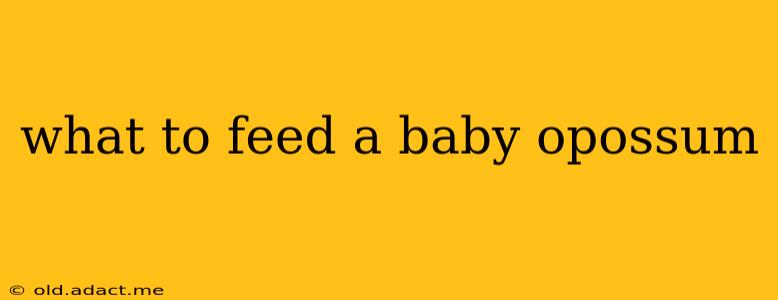Finding a baby opossum, also known as a joey, can be alarming, but it's crucial to handle the situation responsibly. These tiny marsupials are incredibly vulnerable, and improper care can be fatal. This guide will walk you through what to feed a baby opossum, focusing on both immediate needs and long-term care. Never attempt to raise a baby opossum without professional guidance. Your first step should always be contacting a wildlife rehabilitator.
What Should I Feed a Baby Opossum Immediately?
The most important thing to remember is that you should NOT attempt to feed a baby opossum anything yourself without consulting a wildlife rehabilitator. Their nutritional needs are very specific, and improper feeding can cause serious health problems. A rehabilitator can provide the correct formula and feeding techniques to ensure the joey's survival. However, if you find a baby opossum and cannot immediately contact a rehabilitator, here are some crucial steps to take:
-
Keep it warm: Baby opossums are highly susceptible to hypothermia. Place the joey in a warm, safe container, such as a shoebox lined with soft, clean towels. A heating pad set on low (or a warm water bottle wrapped in a towel) can provide additional warmth, but be sure to check the temperature regularly to avoid burns.
-
Keep it hydrated: Dehydration is another major threat. If you are certain the joey is dehydrated, a few drops of warm electrolyte solution (designed for pets) can be administered with an eyedropper (again, only after contacting a professional). Do NOT give the baby opossum regular water or milk.
-
Contact a wildlife rehabilitator IMMEDIATELY: This is the most crucial step. They will be able to assess the opossum's condition, provide proper food and care, and ultimately return it to the wild once it's healthy enough. Locate your local wildlife rehabilitator through online searches or by contacting your local animal control agency or humane society.
What Do Baby Opossums Eat in the Wild?
Wild baby opossums nurse from their mothers, who provide a rich milk providing essential nutrients for growth and development. As they grow, they begin to consume the same diet as their mothers, which consists of:
- Insects: Beetles, ants, grasshoppers, and other insects make up a significant portion of their diet.
- Fruits: Berries, nuts, and other fruits provide valuable sugars and carbohydrates.
- Small vertebrates: Occasionally, baby opossums will consume small animals like lizards, frogs, and mice.
- Carrion: They're opportunistic feeders, and will scavenge on carrion (dead animals) in their environment.
What Foods Should I Avoid Feeding a Baby Opossum?
Absolutely DO NOT give a baby opossum:
- Cow's milk: This is extremely harmful to their digestive systems.
- Dog or cat food: These are inappropriate for their delicate nutritional needs.
- Human food: This can cause serious digestive issues and even death.
- Sugar-sweetened liquids: This can lead to various health problems and is potentially fatal.
How Often Should I Feed a Baby Opossum?
This is a question ONLY a wildlife rehabilitator can answer. The frequency of feeding, along with the type and amount of food, will depend on the joey's age, weight, and overall health. Wildlife rehabilitators are trained in these crucial aspects of opossum care.
What If I Can't Find a Wildlife Rehabilitator?
If you have difficulty finding a wildlife rehabilitator, try searching online for "wildlife rehabilitation near me" or contact your local animal control agency or humane society. They may be able to provide you with a list of contacts or assist you in finding appropriate care for the joey.
Remember, the best approach to caring for a baby opossum is to contact a licensed wildlife rehabilitator immediately. They possess the expertise and resources to provide the necessary care, ensuring the joey's survival and eventual release back into its natural habitat. Improper care can have dire consequences for these fragile animals.
